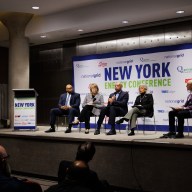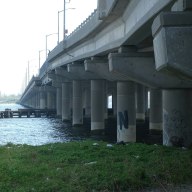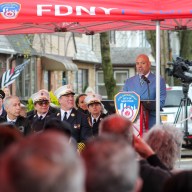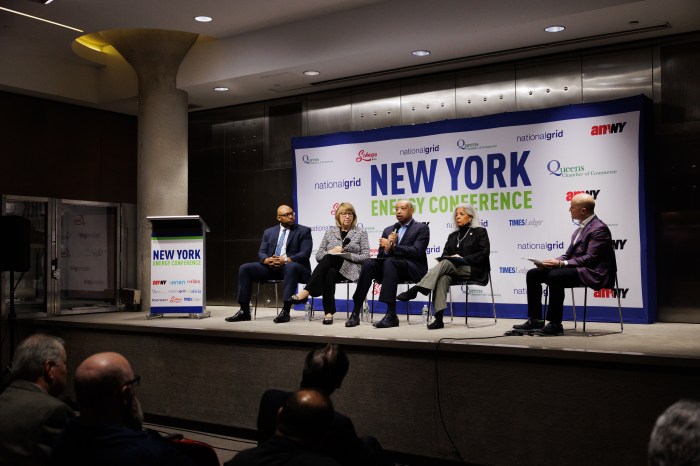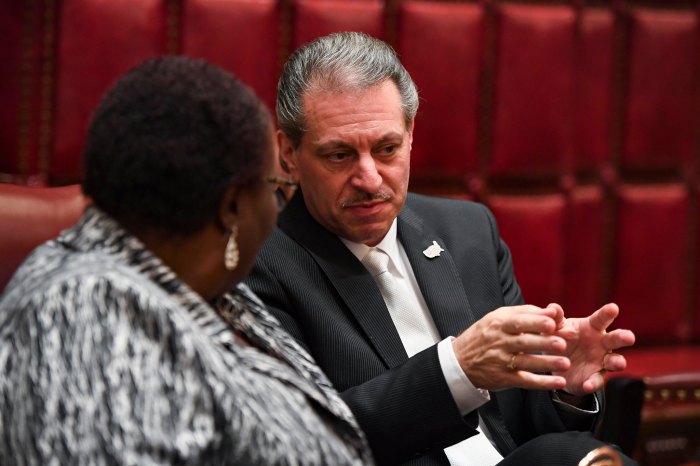By Joe Anuta
Critics of the proposed $3 billion, mixed-use development in Willets Point can look to the 2008 global economic downtown for controversial changes to the massive project, according to city Economic Development Corp. President Seth Pinsky, who discussed some of the thorny issues associated with developing the Iron Triangle.
“This is something, obviously, that many administrations have worked on,” Pinsky said at a recent meeting with the TimesLedger Newspapers, referring to the city’s ambitious plan to turn a series of auto body shops and industrial businesses built on contaminated soil into a new neighborhood between Flushing and Corona.
Mayor Michael Bloomberg announced in June that Sterling Equities, the real-estate arm of the New York Mets, and Related Cos., headed by Manhattan real estate mogul Stephen Ross, won a bidding process to develop the first portion of the 62-acre project, which will eventually include a hotel, housing and retail components along 126th Street across from Citi Field and an entertainment and shopping center on the current Mets parking lot to the west of the stadium.
Bloomberg and Pinsky both tout the project as exactly what the City Council and community signed off on in 2008 when the proposal was wending its way through the city Legislature.
But the EDC has come under fire for changes to how that original plan will be realized.
For starters, the affordable housing component of the project will be the last to be built instead of being constructed concurrently with the retail and hotel portions.
Pinsky partially attributed the change to the 2008 collapse of the Lehman Brothers investment bank, which sent world markets into a tailspin, and the ensuing downturn of the housing market.
“The housing market right now is a challenge,” he said, pointing out that the EDC heard from developers that building the affordable housing in the first phase of the project was simply not feasible.
In addition, he said changing the perception of the neglected conglomeration of industrial shops would entice people to want to move there.
“Over time you would build in people’s heads a positive connotation,” Pinsky said of the area, although there was no mention of this philosophy when the more than 1,000 units of affordable housing were being touted in the Council in 2008.
The EDC asked to meet with the newspaper to present its views on the Willets Point project.
Pinsky has also taken heat for giving the land away for free to Sterling Equities and Related Cos. after the city spent millions purchasing most of it from property owners.
But he again cited the global economic crisis and the cost of cleaning the toxic soil that lies beneath the auto body shops as to why plans changed.
“At the time we were talking about this, it was a different market,” Pinsky said. “In that market, there may have been sufficient value in the land that it would have covered those costs.”
EDC contends it has purchased 95 percent of the land needed for the Sterling and Related project, although a lawyer representing property owners disputes that number. The city recently dropped its legal quest to use eminent domain to condemn the remaining properties because, according to Pinsky, the addition of Willets West may have changed the project enough that the original proceedings would not longer apply to it.
Julie Wood, spokeswoman for the mayor, said the city’s decision to drop the bid “ensures that our plan will comply with the site’s myriad technical and legal requirements.”
The city hopes to negotiate for the remaining parcels of land, but Pinsky said that a new condemnation campaign is not off the table.
Pinsky also touched on the EDC’s recent admission that it lobbied illegally as defined in a report from the state attorney general, saying the law was never clear and that the EDC fully cooperated with the civil investigation.
Many nonprofits, including the National Rifle Association and unions, legally lobby to try and influence legislation, according to EDC. The lobbying was not the problem, but rather how the EDC was categorized by the state as a nonprofit, which triggered the law, according to Pinsky.
EDC now will be reorganized into two entities, one of which will be able to lobby city officials legally, according to Pinsky.
The city did find some savings in the project, however. After off-site infrastructure improvements, including a sewer that will plug into the city’s network, came in at about half the estimated cost, EDC will be throwing some of its $400 million capital budget for the project into paying for ramps off the Van Wyck Expressway and contributing to the cleanup of the contamination at the site, which is primarily being financed by Sterling and Related.
Reach reporter Joe Anuta by e-mail at januta@cnglocal.com or by phone at 718-260-4566.









